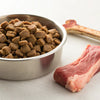Can You Give Cats Dry Dog Food? Understanding the Nutritional Needs of Your Feline Friend
- Houndsy
Table of Contents
- Introduction
- Why Cats and Dogs Have Different Nutritional Needs
- What Happens If My Cat Eats Dog Food?
- Can Cats Eat Dog Food in an Emergency?
- Why Does My Cat Want to Eat Dog Food?
- Tips for Managing Multi-Pet Households
- Conclusion
Introduction
Imagine this: you've just fed your dog, and a few moments later, you catch your cat sneaking a few kibbles from the dog's bowl. It's a common scenario that raises an important question among pet owners: Can you give cats dry dog food? The answer may not be as straightforward as you think. While a cat might nibble on dog food occasionally without immediate harm, the long-term implications can be quite serious.
In this blog post, we will explore the dietary needs of cats, the nutritional differences between dog food and cat food, and why feeding your cat dog food is generally a bad idea. We'll also provide tips for managing multi-pet households to ensure your feline friend gets the nutrition they need. By the end of this article, you'll have a comprehensive understanding of why it's essential to feed your cat food formulated specifically for them.
Let's dive into the world of cat nutrition and address the burning question: Can you give cats dry dog food?
Why Cats and Dogs Have Different Nutritional Needs
The Basics of Feline Nutrition
Cats are classified as obligate carnivores, meaning that their diet must primarily consist of meat. This dietary requirement is due to their unique physiology and evolutionary history. Unlike dogs, who are omnivores and can thrive on a more varied diet, cats have specific nutritional needs that must be met for them to maintain optimal health.
Here are some essential nutrients that cats require:
- Taurine: This amino acid is crucial for heart health, vision, and overall bodily function. Cats cannot synthesize taurine on their own and must obtain it from animal tissues found in meat.
- Arachidonic Acid: This essential fatty acid is vital for various bodily functions, including inflammation regulation and skin health. Cats cannot produce arachidonic acid, so it must be included in their diet.
- Vitamin A: Unlike dogs, cats cannot convert beta-carotene from plant sources into vitamin A. They require preformed vitamin A, often found in animal-based foods.
- Niacin: This B vitamin is vital for energy metabolism and is present in higher quantities in meat than in plant-based foods.
The Composition of Dog Food
In contrast, dog food is formulated with a different nutritional profile. While it may contain protein, it often lacks sufficient levels of the essential nutrients that cats require. Key differences include:
- Protein Content: Most dog foods contain lower levels of protein (typically 18-26%) compared to the 30-34% recommended for cats. This can lead to protein malnutrition if a cat is fed dog food exclusively.
- Carbohydrate Levels: Dogs can digest carbohydrates better than cats, which means dog food often contains higher carbohydrate content. Cats have a limited ability to process carbohydrates, making a high-carb diet unsuitable for them.
- Lack of Essential Nutrients: As mentioned, dog food often lacks taurine, arachidonic acid, and adequate levels of vitamin A and niacin—key nutrients for feline health.
What Happens If My Cat Eats Dog Food?
Short-Term Risks
Occasional consumption of dog food is unlikely to cause immediate harm to your cat. If your feline companion sneaks a few kibbles now and then, they will probably be fine. However, it’s important to monitor for any signs of digestive upset, including:
- Vomiting
- Diarrhea
- Constipation
Long-Term Consequences
Feeding your cat dog food regularly can lead to serious health issues over time. Cats that rely on dog food as their primary diet may experience:
- Malnutrition: Due to the lack of essential nutrients, prolonged feeding of dog food can lead to malnutrition.
- Heart Disease: A deficiency in taurine can result in dilated cardiomyopathy, a serious heart condition.
- Vision Problems: Lack of adequate vitamin A can lead to vision issues and other eye health problems.
- Weakened Immune System: Insufficient nutrients can impair your cat's immune response, making them more susceptible to illnesses.
Can Cats Eat Dog Food in an Emergency?
In an emergency situation where cat food is unavailable, a small amount of dog food may serve as a temporary substitute. However, this should not be a long-term solution. If your cat consumes dog food during such situations, it’s crucial to transition them back to a balanced diet formulated for cats as soon as possible.
Alternative Emergency Foods for Cats
If you find yourself in a pinch, consider offering your cat alternative protein sources that are safe for them, such as:
- Cooked chicken
- Turkey
- Fish (without bones)
- Eggs (cooked)
These options can provide the necessary nutrients until you can replenish your cat's food supply.
Why Does My Cat Want to Eat Dog Food?
Cats are naturally curious creatures, and their interest in dog food may stem from several factors:
- Curiosity: Cats are instinctively curious and may explore the food of other pets in the household.
- Dietary Variety: If a cat is bored with their food, they may be tempted to try something different.
- Nutritional Deficiencies: In some cases, a cat's desire to eat dog food may indicate that they are lacking essential nutrients in their diet.
Tips for Managing Multi-Pet Households
Managing a household with both cats and dogs can be challenging, especially when it comes to mealtime. Here are some tips to keep your pets from eating each other's food:
- Separate Feeding Areas: Feed your cat and dog in different locations to prevent them from stealing each other's food.
- Elevated Bowls: Consider using elevated feeding bowls for your dog. This can help keep the dog's food out of reach of your cat.
- Supervised Feeding: Monitor mealtime to ensure each pet eats their designated food.
- Automatic Feeders: Invest in microchip feeders that will only open for the specific pet, ensuring they can access their food without interference.
Conclusion
In summary, while a cat may nibble on dog food without immediate adverse effects, it's crucial to recognize the long-term risks associated with feeding them a diet not formulated for their specific nutritional needs. Cats are obligate carnivores that require a diet rich in protein and essential nutrients such as taurine, arachidonic acid, and vitamin A. Therefore, it's best to ensure that your furry friend receives high-quality cat food tailored to their dietary requirements.
If you ever find yourself unsure about your pet's diet or have concerns about their eating habits, consulting with a veterinarian is always a wise choice. They can provide personalized recommendations based on your pet's health and nutritional needs.
For a convenient and aesthetically pleasing way to store your cat's food, consider exploring the Houndsy Kibble Dispenser. This innovative product not only simplifies the feeding process but also ensures that your pet's food remains fresh and accessible.
FAQ
Can a cat survive on dog food?
Cats can survive on dog food for a short time but may develop health issues if fed dog food exclusively over the long term.
What should I do if my cat eats dog food?
If your cat eats dog food, monitor them for any signs of digestive upset. If they exhibit symptoms like vomiting or diarrhea, consult a veterinarian.
How can I keep my cat away from my dog's food?
Consider feeding your pets in separate areas, using elevated bowls, or investing in automatic feeders to prevent them from accessing each other’s food.
What are some safe foods I can give my cat in an emergency?
In an emergency, you can offer your cat cooked chicken, turkey, or fish as temporary substitutes until you can obtain cat food.
Is it okay for my dog to eat cat food?
While it’s not recommended, dogs can eat cat food in small amounts without immediate harm. However, it should not be a regular part of their diet due to its high protein and fat content.













